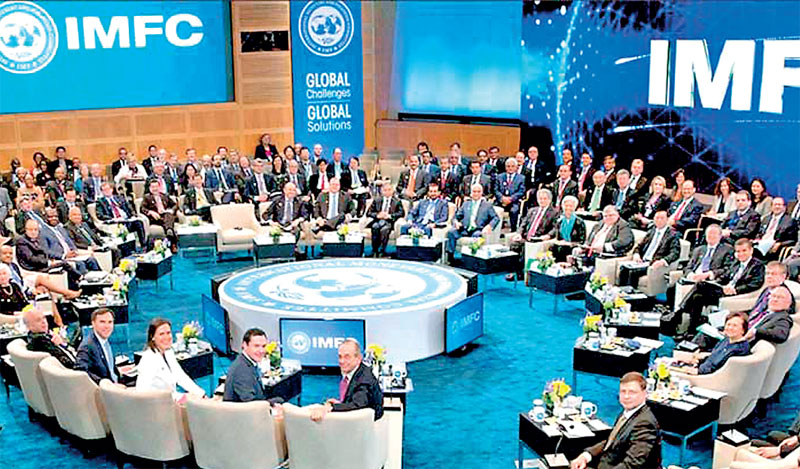Friday Feb 20, 2026
Friday Feb 20, 2026
Monday, 27 December 2021 02:18 - - {{hitsCtrl.values.hits}}

The IMF’s Executive Board has approved an 18-month extension (through end-June 2023) of the temporary increases to the cumulative access limits under its emergency financing instruments, i.e., the Rapid Financing Instrument (RFI) regular window, the Rapid Credit Facility (RCF) Exogenous Shock window, and the RFIs and RCFs Large Natural Disaster (LND) windows and allowed all other access limits that had been temporarily increased to return to their pre-pandemic levels from 1 January 2022 as scheduled.
This decision reflects the expected and ongoing gradual shift to upper-credit-tranche (UCT) quality arrangements from emergency financing triggered by urgent, pandemic-related balance of payment (BoP) needs. At the same time, the decision ensures continued access by member countries to the Fund’s emergency financing, should urgent BoP needs arise when a UCT-quality arrangement is either not necessary or not feasible.
The temporary increases in access limits for the RFI regular window and the RCF Exogenous Shock window were first introduced in April 2020 and extended in September 2020, and again in March 2021. For the RFI and RCF LND windows, the temporary increases were introduced in June 2021.
The Executive Board reinstated the limit on the number of disbursements under the RCF within a 12-month period and endorsed staff’s proposal to prepare an exit strategy from the temporary increase in cumulative access limits under emergency financing instruments by end-June 2023.
Executive Directors noted that the temporarily-high access limits ensured that the Fund was able to swiftly provide adequate support to its members during the pandemic. They stressed that access limits are a key element of the Fund’s risk management framework, providing safeguards to Fund resources and preserving the revolving nature and catalytic role of Fund financing. Returning annual access limits to lower levels while extending the cumulative access limits for emergency financing balances the need to preserve member countries’ borrowing space with safeguarding Fund resources.
Directors agreed with the proposal to extend the temporarily-higher cumulative access limits under the Fund’s emergency financing instruments for 18 months, while allowing all other temporarily-increased access limits to expire and return on 1 January 2022 to pre-pandemic levels, except for the PRGT normal annual access limit, which will become 145% of quota as approved in July 2021. They also noted that the PRGT normal cumulative access limit was increased on a non-transitory basis to 435% of quota in July 2021. A few Directors thought that the extension of the cumulative limits under the emergency financing instruments could have been shorter.
Directors agreed that the respective cumulative access limits for the regular window of the Rapid Financing Instrument (RFI) and the exogenous shocks window of the Rapid Credit Facility (RCF) will remain at 150 percent of quota through end-June 2023. They also agreed that cumulative access limits for the RFIs and RCFs Large Natural Disaster (LND) windows will remain at 183.33% of quota through end-June 2023. Directors noted that the further temporary extension of the higher cumulative access limits for emergency financing instruments would have a limited impact on GRA and PRGT resources.
Directors also agreed to reinstate from 1 January 2022 the temporarily-suspended two-disbursement limit under the RCF within a 12-month period. They took note that no member requested RCF disbursements in excess of such limit despite its relaxation during the pandemic period.
Directors noted that the extensions of the temporarily-higher cumulative access limits would leave adequate borrowing room to support urgent balance of payments needs under the emergency financing instruments for most Fund members when upper credit tranche (UCT)-quality programs are either not feasible or not necessary. Some Directors urged careful monitoring to ensure that affected countries are not unduly constrained by the return to lower annual access limits.
Many Directors emphasised the need for a rigorous and transparent application of the qualification requirements for emergency financing, including a convincing justification in case a UCT-quality program is assessed to be not feasible, and some highlighted the importance of strong governance and robust safeguards for the use of emergency financing.
Directors underscored that members should be encouraged to transition to tailored, UCT-quality programs when appropriate and feasible to support structural reforms to address underlying vulnerabilities and larger financing needs. In this context, Directors welcomed the fact that members have been increasingly seeking financial assistance under Fund arrangements that meet UCT-quality standards rather than through emergency financing instruments.
Directors generally welcomed the staff proposal to prepare an exit strategy by end-June 2023 and asked for early Board engagement. Some Directors emphasised that the 18-month extension should be the last, and a few called on staff to prepare an exit strategy much earlier than proposed. A few other Directors recommended having greater flexibility.